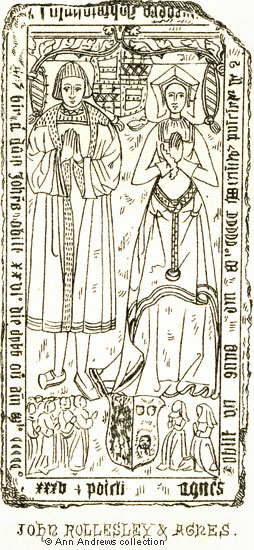| |
| Darley Dale, St. Helen's Church, Interior |
|
|
Above is a view of the chancel and nave taken at the very beginning
of the twentieth century.
A few years later J. B. Firth
visited St. Helen's whilst researching material for his book
on Derbyshire. He noted that the church interior showed
a medley of styles, and "the monuments go back to a certain
John de Darley early in the fourteenth century"[1].
Sir John de Darley had been Lord of the Manor and the carving
on his tomb shows him in a suit of mail, with his legs crossed
and a heart in his hands[2].
The tomb is sited between the nave and what is now known
as St. Chad's Chapel but was formerly the South transept or "Columbell's
Quire", so named because a slab in memory of the Columbell
family used to be there[3].
Firth thought "the most interesting [monuments] are the
effigy slabs of the Rollesley family of the middle of the sixteenth
century, whose name survives in Rowsley"[1] (see
below).
He described Edward Burne Jones' Song of Solomon window,
in memory of one Raphael Gillman who died in 1860 at the
age of ninety, as consisting "of twelve blazing panels,
utterly unlike the ordinary pallid designs for church windows.
The colours are vivid; the contrasts sharp; the scenes and
the figures alike
bizarre. The window is a picture puzzle, challenging attention
and demanding an answer, and must be a great rival to the preacher
during sermon time"[1].
This superb window is in St. Chad's Chapel.
The chancel, mid twentieth century.
Rollesley Monuments
In 1876 Cox noted that the two monumental slabs of the Rollesleys,
which would have originally been the upper stones of altar
tombs, were against the west wall of the north transept. The
designs on them were so distinct because they had been filled
in with pitch[3].

John and Elizabeth (nee Cheney) Rollesley, with
eight sons and four daughters, is the larger
of the two stones and dates from 1513[3]. |
|

John and Agnes (nee Hybalt) Rollesley's stone is about half the size. The couple have ten sons and two daughters at their feet. John died in 1535 and Agnes in 1550. This John was the son of John and Elizabeth[3]. |

Corbel of Staircase in the Tower
|
1. "Darley Dale Church, Interior". Stengel & Co.
Ltd., 39 Redcross Street, London E. C. No.16177. Not posted,
but side band and undivided back, so about 1900. Posted 21
March 1903. Message and front side bar on the card not shown. © Judy
Cooper collection.
2. "St. Helen's Church, Darley Dale". A. W. Bourne,
32 Babingley Drive, Leicester This is a Real Photograph. Not
posted. © Ann Andrews collection.
3, 4, 5. Three illustrations from Cox's "Churches"[3], © Ann
Andrews collection.
In the collection of, provided by, researched and written by © Ann
Andrews. Intended for personal use only.
|
References:
[1] Firth, J. B. (1908) "Highways
and Byways in Derbyshire" MacMillan & Co., London.
[2] Mee, Arthur (ed.) (1937) "Derbyshire:
The Peak Country",The King's England Series, Hodder
and Stoughton Limited, London
[3] Cox, J. Charles (1877) "Notes
on the Churches of Derbyshire Vol II" Chesterfield:
Palmer and Edmunds, London: Bemrose and Sons, 10 Paternoster
Buildings; and Derby. The alabaster slab to the Columbells
had been moved to the churchyard when the church underwent
restoration, but Cox reported that it was back inside the
church, against the wall at the west end of the south aisle,
when he wrote his book.
More on site information about Darley and the surrounding area:
 Magic
Lantern Slide of St. Helens Magic
Lantern Slide of St. Helens
 Kelly's
1891 Directory, Darley Kelly's
1891 Directory, Darley
 Derbyshire's
Parishes, 1811 Derbyshire's
Parishes, 1811
 Pigot's
1828-9 Directory, with Matlock, Matlock Bath and Bonsall
includes Darley names Pigot's
1828-9 Directory, with Matlock, Matlock Bath and Bonsall
includes Darley names
 Wolley
Manuscripts, Matlock Wolley
Manuscripts, Matlock
Also see
 Wolley
Manuscripts, Derbyshire for more information about Derbyshire
deeds, pedigrees, documents and wills Wolley
Manuscripts, Derbyshire for more information about Derbyshire
deeds, pedigrees, documents and wills
 Joseph
Whitworth - "Lives Which Hung by a Thread",
a magazine article about the Whitworth Sharpshooter which
now includes (Dec 2008) additional material about both Whitworth
and the development of the rifle. Joseph
Whitworth - "Lives Which Hung by a Thread",
a magazine article about the Whitworth Sharpshooter which
now includes (Dec 2008) additional material about both Whitworth
and the development of the rifle.
|
|
|